The Dictatorship
Takeaways from new emails about Trump and his late friend Epstein
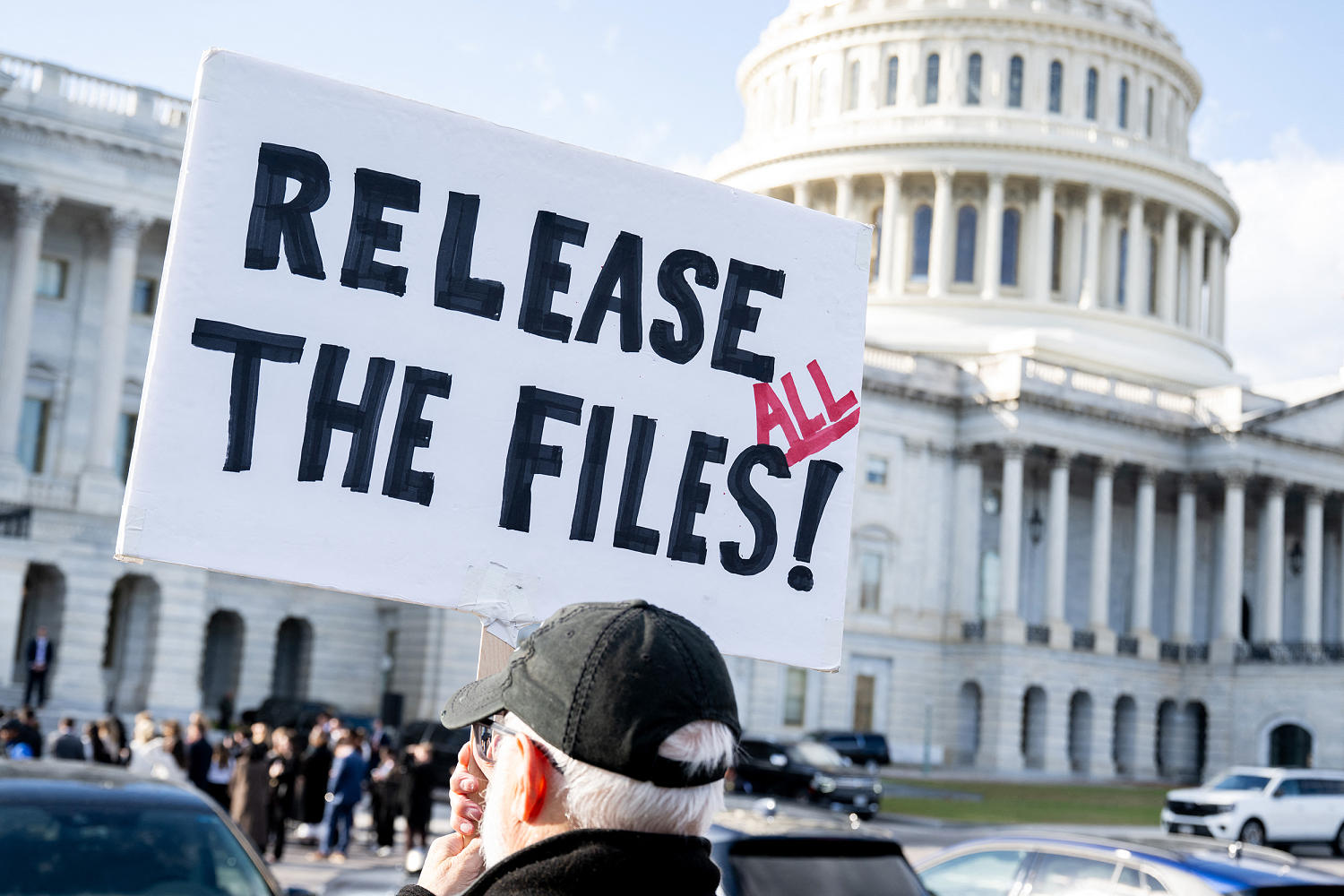
Democrats on the House Oversight Committee released a series of emails Wednesday revealing new insight into President Donald Trump’s relationship with deceased convicted sex offender Jeffrey Epstein. Soon after, the Republican-led committee released a tranche of 20,000 documents it received from the Epstein estate in response to a congressional subpoena, including additional private email correspondence between Epstein and his associates — some of which was unflattering to the GOP president.
As BLN continues to sift through the new records for additional revelations, here are some emerging takeaways. BLN has not independently verified claims made in the emails. Epstein’s emails are quoted exactly as they were written, without correcting grammar or punctuation.
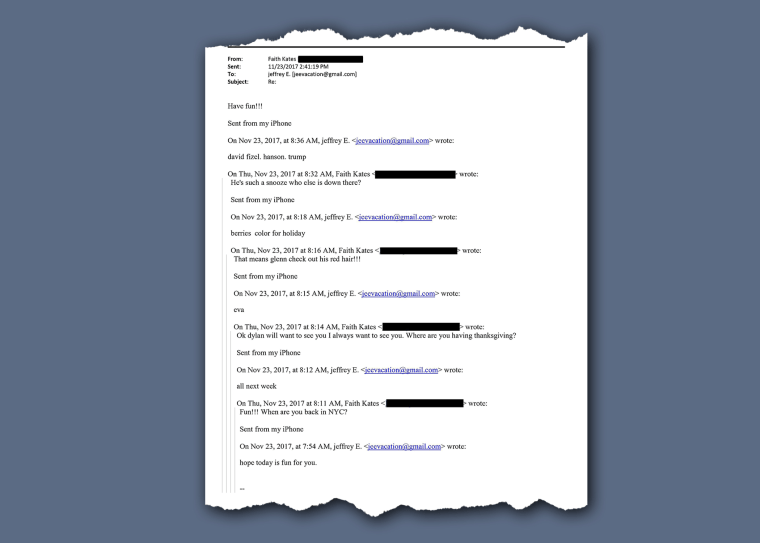
Epstein implies he spent Thanksgiving with Trump
Epstein claimed he was spending Thanksgiving in 2017 with Trump. In an email exchange with Epstein on Thanksgiving morning on Nov. 23, 2017, Manhattan modeling management guru Faith Kates asked the disgraced financier where he was spending Thanksgiving, to which Epstein replied, “eva” — a likely reference to his former girlfriend Eva Andersson-Dubin, who would later testify at Ghislaine Maxwell’s sex-trafficking trial in late 2021.

Kates mentions Andersson-Dubin’s husband, Glenn Dubin, by name in the exchange and asks Epstein: “who else is down there?” Epstein replied by naming Trump, hedge fund founder David Fiszel and someone he referred to as Hanson. According to White House records, Trump spent Thanksgiving of 2017 — his first as president — at his Mar-a-Lago resort in Palm Beach. The White House did not disclose the guest list.
Epstein was invited to Jared Kushner’s New York Observer 25th Anniversary party in 2013
In a sign of both Epstein’s societal status and his ties to Trump’s inner circle, among the emails released by the House Oversight Committee was an invitation from Jared Kushner for Epstein to attend a party celebrating the New York Observer’s 25th Anniversary. Kushner at the time was the newspaper’s publisher, a role he held until 2017, when he sold his stake to join his father-in-law’s first administration. According to a copy of the invitation cited in the congressional documents released Wednesday, the outlet sought to celebrate New York’s “best, brightest and most influential in culture, media and finance.”
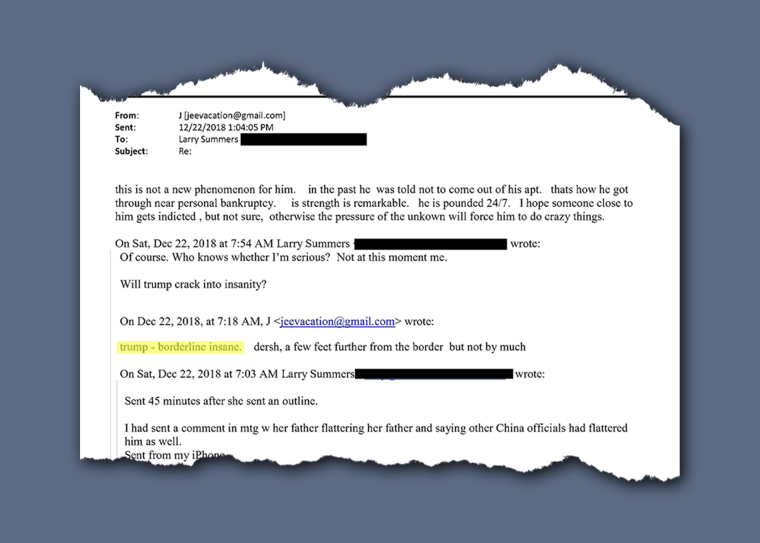
Epstein and his associates repeatedly mocked Trump’s mental acuity
Epstein joked about Trump’s mental stability, referring to him as “borderline insane” in a Dec. 22, 2018, email to former Treasury Security Larry Summers, who replied, “Will Trump crack into sanity?” Epstein wrote back a few minutes later, saying: “this is not a new phenomenon for him. In the past he was told not to come out of his apt. thats how he got through new personal bankruptcy.”
Summers declined to comment to The New York Timeswhich wrote an extensive story on the former Treasury secretary’s personal email communications with Epstein.
However, Epstein also appeared to credit Trump for his ability to withstand scandals, writing his “strength is remarkable.”
Epstein followed Trump’s election and scandals
Epstein shared and received news reports around Trump’s first presidential campaign and term as well as stories detailing accusations against Trump of business misdealing and sexual misconduct. Trump has repeatedly maintained his innocence on both fronts. In one email that appeared to belong to a former New York Times journalist, Epstein claims to have been in possession of a “photo of donald and girls in bikinis.”
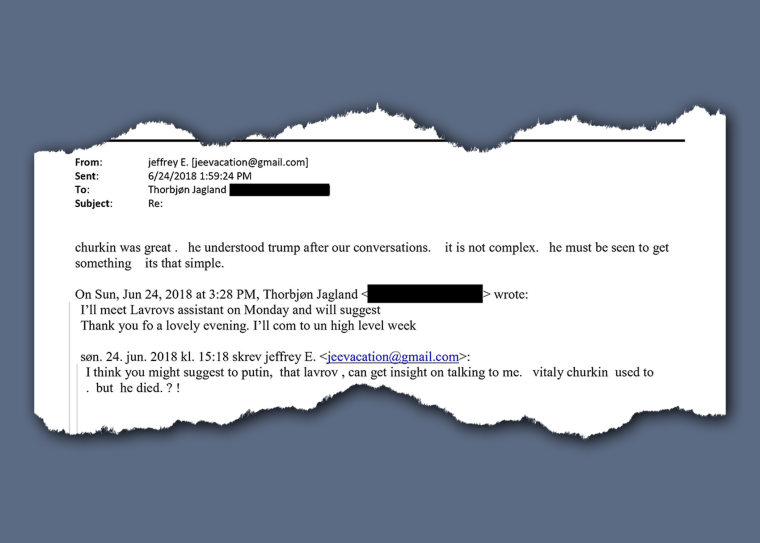
Epstein offered “insight” to foreign contact ahead of Trump’s meeting with Putin
Epstein tapped his vast network of international connections to lay groundwork ahead of Trump’s meeting with Russian leader Vladimir Putin in Helsinki in 2018. Epstein suggested in an email to the former prime minister of Norway, Thorbjorn Jagland, who was serving as secretary general of the Council of Europe at the time, that Russian officials contact him for “insight” ahead of Putin’s scheduled meeting with Trump. Jagland had asked Epstein in another exchange to help him “understand more about Trump and what’s going on in American society.” The late financier and convicted sex offender mentioned that he had already talked to Russia’s ambassador to the United Nations, Vitaly Churkin.
“Churkin was great. He understood trump after our conversations,” Epstein wrote. “it is not complex. he must be seen to get something its that simple.”
White House press secretary Karoline Leavitt said Wednesday, “These emails prove absolutely nothing other than the fact that President Trump did nothing wrong.”
The Dictatorship
Grocery stores are anxious for customers to get SNAP benefits restored

A little more than a year ago, Ryan Sprankle welcomed President Donald Trump to one of the three grocery stores his family owns near Pittsburgh. Trump was on the campaign trail; they talked about high grocery prices, and the Republican nominee picked up a bag of popcorn.
But these days, Sprankle would have a different message if Trump or any lawmakers visited his store. He wants them to know that delayed SNAP benefits during the government shutdown hurt his customers and his small, independent chain.
“You can’t take away from the most needy people in the country. It’s inhumane,” Sprankle said. “It’s a lack of empathy and it’s on all their hands.”
The Trump administration froze funding for the Supplemental Nutrition Assistance Program at the end of October, impacting food access for some 42 million Americans. On Monday, the U.S. Senate passed legislation that would reopen the federal government and replenish SNAP funds. The U.S. House is scheduled to vote on that bill Wednesday evening. But it’s unclear when SNAP payments might resume if the government reopens.
In 2024, SNAP recipients redeemed a little more than $96 billion in benefits, according to the U.S. Department of Agriculture, which administers the program. The majority – 74% — was spent at superstores and supermarkets, a category that includes big chains like Walmart and Kroger but also some independent stores like Sprankle’s.
Around 14% was spent at smaller grocery and convenience stores, businesses often tucked into neighborhoods and more easily accessible to SNAP beneficiaries.
A stalled economic engine
Etharin Cousin, a former director of the United Nations World Food Program and founder of the nonprofit Food Systems for the Future, said the cutoff of SNAP benefits had immediate impacts on grocers and convenience stores of all sizes, most of which operate on slim profit margins of 1% to 2%.
“SNAP isn’t just a social safety net for families. It’s also a local economic engine,” Cousin said. “SNAP benefits flow directly into neighborhoods, stores, regional distributors and community jobs.”
Walmart declined to comment on the impact of the SNAP funding lapse but noted that it has been lowering prices and donating to local food banks. Kroger also declined to comment.
Shoppers not receiving their food benefits affects all retailers but becomes “a big problem more quickly” at small chains, Sprankle said. His Kittanning, Pennsylvania, store gets 25% of its revenue from SNAP, but customers who don’t get government assistance also are worried about the shutdown, according to Sprankle. They’re spending less, trading down to cheaper goods or heading to food bankshe said.
Sprankle said lower sales cut into the overtime he can offer to the chain’s 140 employees. Many are worried about losing their jobs, he said.
“They have families to feed, they have kids to buy gifts for,” he said. “If I have to sell my truck, we’re going to give Christmas bonuses.”
Liz Abunaw, the owner and operator of Forty Acres Fresh Market in Chicago, recently saw a customer putting back a full cart of groceries because she couldn’t afford them without SNAP.
Abunaw opened the supermarket in September after years spent selling produce at pop-up markets and in delivery boxes. Only about 12% of Abunaw’s revenue comes from SNAP benefits right now, she said. But without it — or if SNAP recipients spend less money in her store — it will slow Forty Acres’ growth and make it harder to pay the workers, suppliers and farmers who depend on her, she said.
“SNAP is currency. I get money I then use in this economy. It’s not a food box,” Abunaw said. “The economic impact of SNAP is larger than the dollars spent.”
From neighborhood shops to food pantries
The suspended food aid also had an immediate impact on Kanbe’s Markets, a nonprofit that stocks produce in coolers at 110 convenience stores around Kansas City, Missouri. Kanbe’s distributes a mixture of donated food and food purchased from wholesalers to keep prices low, founder and CEO Maxfield Kaniger said.
Kanbe’s also distributes free food to 50 food pantries and soup kitchens around the city.
Kaniger said some of the convenience stores he works with saw their sales drop 10% in the days after Nov. 1, when SNAP benefits weren’t paid. At the same time, the food pantries he supplies asked for double or triple their usual orders.
Because it’s giving away more food than usual, Kanbe’s has to spend more buying produce for the coolers it stocks. It’s frustrating for Kaniger, who must make decisions quickly before food spoils.
“It should be enough that people are going without food. Period, end of sentence. People going without food is wrong,” he said.
Babir Sultan sells berries, lemons, potatoes, bananas and other produce from Kanbe’s at his four FavTrip convenience stores in the Kansas City area. His stores are in food deserts, far from other groceries or big retailers, he said, so it’s important to him to stock fresh produce for those neighborhoods.
Sultan said foot traffic at his stores fell 8% to 10% in early November after SNAP funding ceased. He decided to offer $10 of free produce to SNAP beneficiaries but said he’s also happy to help out other customers who might be struggling right now.
“If you’re in need, just ask, we’ll take care of you,” Sultan said. “Everybody is affected whenever the customer is feeling the pinch.”
___
Durbin reported from Detroit. Associated Press data journalist Kasturi Pananjady in Philadelphia contributed to this report.
The Dictatorship
After 43 days in the dark, Congress turns the government’s lights back on

House lawmakers returned to the Capitol on Wednesday and passed the bipartisan government funding package, leaving lawmakers one Donald Trump signature away from ending the longest shutdown in U.S. history.
After 43 days of shuttered government and unpaid federal workers, the House voted 222-209 to pass the Senate’s funding deal — with 216 Republicans and six Democrats supporting the bill, and two Republicans and 207 Democrats opposed.
The legislation includes a full fiscal year’s worth of funding for the Department of Agriculture, the Department of Veterans Affairs, military construction and the legislative branch itself. It also funds the remaining parts of government until the end of January, giving lawmakers more time to negotiate another spending deal.
Notably, the agreement to reopen the government also would reverse layoffs that took place during the shutdown, and would block more layoffs until February.
“From the very beginning of this whole ordeal, on the Republican side, we operated in good faith,” Speaker Mike Johnson, R-La., said on the House floor Wednesday night.
“Every single day of this shutdown, we went right out, looked in the camera with a press conference, and told the American people the simple truth: We have done for the people what has been right and just and truthful,” he said.
He added that he didn’t want to take up more time speaking because he just wanted to reopen the government.
Meanwhile, House Minority Leader Hakeem Jeffries, D-N.Y., said Republicans have “zero interest” in making life better for the American people, taking particular issue with Republicans refusing to extending Obamacare subsidies.
“It can’t be the case that health care is simply a privilege for the wealthy, the well-off and well-connected,” Jeffries said, claiming that was the Republican perspective. “We believe as Democrats that health care has to be a right, and a right that’s affordable and available to every single American in the United States. That’s what this fight is all about.”

Predictably, the vote fell almost entirely along party lines, with Reps. Henry Cuellar, D-Texas, Don Davis, D-N.C., Jared Golden, D-Maine, Adam Gray, D-Calif., Marie Gluesenkamp Perez, D-Wash., and Tom Suozzi, D-N.Y., joining Republicans in support of the bill. Only Reps. Thomas Massie, R-Ky., and Greg Steube, R-Fla., opposed the bill on the GOP side.
Democratic leaders urged their members to vote against the legislation, noting it didn’t address their central shutdown demand: the Obamacare subsidies.
Throughout the shutdown, which started on Oct. 1, Democrats have insisted they’d need substantive action on extending the subsidies before they’d vote to reopen the government. But after eight Senate Democrats went along with Republicans in the upper chamber, the leverage Democrats once had to extract those demands promptly exited through a Senate chamber door.
The enhanced Affordable Care Act tax credits are set to expire at the end of the year, and without action on those subsidies, premiums for Obamacare will skyrocket next year.
Republicans have argued health care should be addressed separately from government funding — and insisted they would only negotiate on the premiums once the government was reopened — but it’s unclear how serious Republicans are about extending those tax credits.
While a resolution to the shutdown looked doubtful throughout the standoff, a deal suddenly took shape over the weekend — following a dramatic week that saw progressive Democrats feeling empowered by convincing wins during last week’s elections, and moderate Democrats feeling like the shutdown could drag on for many weeks more.
The group of rank-and-file Democrats, who had been talking regularly for weeks with Republicans, finally took the GOP’s offer: reopen the government with a bipartisan funding bill, and get a vote on extending the Obamacare subsidies, as promised by Senate Majority Leader John Thune, R-S.D.
The critical moment came Sunday, when those eight members of the Senate Democratic caucus broke ranks and joined Republicans to help the bill overcome the 60-vote filibuster. The Senate gave final passage to the legislation Monday evening.
Many Democrats slammed their colleagues for working with Republicans to end the standoff, arguing they caved. Some called for Senate Minority Leader Chuck Schumer, D-N.Y., to step aside — despite the fact he opposed the final deal and voted against it.
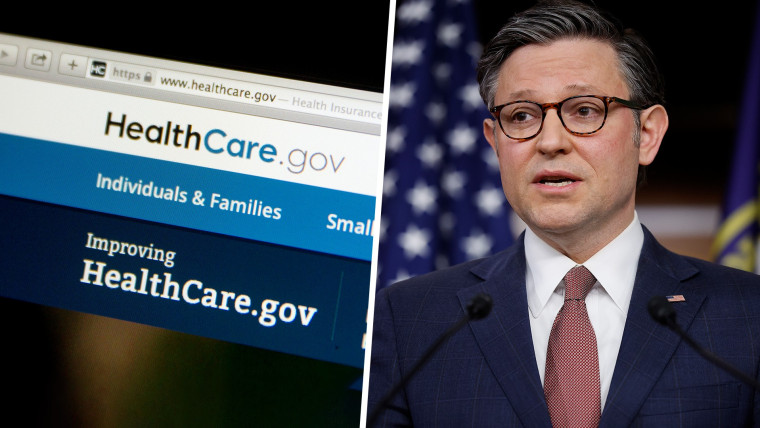
Although the deal includes a promised Senate vote on health care, there is no guarantee such a measure will pass the chamber, with the support of Senate Republicans needed to get such a measure over the line.
In the House, Johnson and his leadership team have offered no commitment to vote on extending the subsidies.
Final passage of the government funding bill was not without a last-minute hiccup in the House.
Senators included a provision in the bill that would give Republican senators who had their phone records collected without their knowledge — as part of Jack Smith’s investigation into Trump’s efforts to overturn the 2020 election — the right to sue, allowing them to potentially collect $500,000 in damages.
But the provision received bipartisan backlash in the House, and Johnson ultimately agreed to advance separate legislation to undo the language.
“We are putting this legislation on the fast-track suspension calendar in the House for next week,” Johnson said.
Kevin Frey is a congressional reporter for BLN. He previously served as Washington correspondent for Spectrum News NY1. A graduate of George Washington University, he grew up in Pennsylvania.
She covers Capitol Hill involving both Democrats and Republicans. She previously covered Congress at Blue Light News. She graduated from George Washington University’s School of Media and Public Affairs with a bachelor’s degree in journalism and mass communication and political science.
Syedah Asghar
contributed
.
The Dictatorship
The 2026 Democrats aren’t happy with the shutdown deal

Welcome to “The Blueprint with Jen Psaki” newsletter. Each week, Jen dives into the key players, emerging issues and strategic movements shaping the future of the Democratic Party. Subscribe now to get her insights delivered straight to your inbox.
Democrats on the deal
The biggest tell of how the shutdown deal is playing politically may be the reaction of basically any candidate for Senate who is facing voters next year.
In Georgia
Sen. Jon Ossoff, the most vulnerable Democrat in 2026, joined Sen. Raphael Warnock in voting against the deal, warning that it would double health care premiums for 1.4 million Georgians.
“With health care votes ahead, the question is whether Republicans in Congress will join us to prevent catastrophic increases in health insurance premiums,” Ossoff said.
In Michigan
Three of the Democrats running for the Senate nomination in Michigan next year — U.S. Rep. Haley Stevens, state Sen. Mallory McMorrow and former Wayne County health director Abdul El-Sayed — have centered their campaigns on congressional dysfunction. All three strongly opposed the shutdown deal.
Stevens said that the deal “doesn’t work for Michigan” and that she will need “a whole lot more than empty promises” that costs will be lowered. McMorrow said in a recent campaign video that “we have to do things differently,” noting that the “old way” is not working, and called for new Senate leaders. And El-Sayed labeled the move “a s––– deal” and slammed Democrats for giving up the only leverage they had, adding, “I don’t know what is worse, Trump’s cruelty or fecklessness in the face of cruelty.”
In Maine
Both Gov. Janet Mills and political newcomer Graham Platner slammed the deal, although their slightly different tones indicated the divide in the race. Platner described the deal as a disaster and called for new leadership, stating“Chuck Schumer failed in his job yet again.”
Mills, encouraged by Senate Minority Leader Schumer to get into the race in the first place, called out her party more obliquely. “Maine people deserve affordable health care — not just the promise of a vote that won’t go anywhere,” she wrote on X. “Fight back.”
What does it all mean?
It’s hard to imagine that the reaction could be any more universal. And it tells us that there is pretty unanimous frustration with the old way of doing things in Washington and a demand for a tougher approach, especially in the age of Donald Trump. And, more important, it is a reminder that lowering the cost of health care remains a fight worth having.
Join the Debate
Ask Jen
“Why is the Democratic leadership tolerating Chuck Schumer? He is an embarrassment and out of touch with voters.”
— Catharine Pomerleau, Buckerfield, Maine
Hi Catharine,
There is hardly anything about institutions or leaders in Washington that is popular right now. And while Chuck Schumer was once a great Senate majority leader, it’s pretty clear by any metric that it’s time for new blood at the top. It is hard to imagine that he remains in a leadership position past the midterm elections next year. And the good news is there is a crop of rising stars who could jump into that job.
Every week, Jen selects a question to answer from a newsletter subscriber. If you have a question for Jen, submit it here and subscribe to the newsletter and for a chance to be featured in a future edition.
This week on the podcast
For the latest episode of the “The Blueprint” podcastI sat down with Rep. Maxwell Alejandro Frost for a conversation about what the Senate’s deal to reopen the government means for Americans’ fight for more affordable health care and the future of leadership in the Democratic party. Subscribe now and never miss an episode.
Jen Psaki is the host of “The Briefing with Jen Psaki”airing Tuesdays through Fridays at 9 p.m. EST. She is the former White House press secretary for President Joe Biden.
-
Uncategorized1 year ago
Bob Good to step down as Freedom Caucus chair this week
-

 Politics9 months ago
Politics9 months agoFormer ‘Squad’ members launching ‘Bowman and Bush’ YouTube show
-

 The Dictatorship9 months ago
The Dictatorship9 months agoPete Hegseth’s tenure at the Pentagon goes from bad to worse
-

 The Josh Fourrier Show1 year ago
The Josh Fourrier Show1 year agoDOOMSDAY: Trump won, now what?
-

 Politics9 months ago
Politics9 months agoBlue Light News’s Editorial Director Ryan Hutchins speaks at Blue Light News’s 2025 Governors Summit
-

 The Dictatorship9 months ago
The Dictatorship9 months agoLuigi Mangione acknowledges public support in first official statement since arrest
-

 Politics9 months ago
Politics9 months agoFormer Kentucky AG Daniel Cameron launches Senate bid
-

 Politics1 year ago
Politics1 year agoWhat 7 political experts will be watching at Tuesday’s debate












